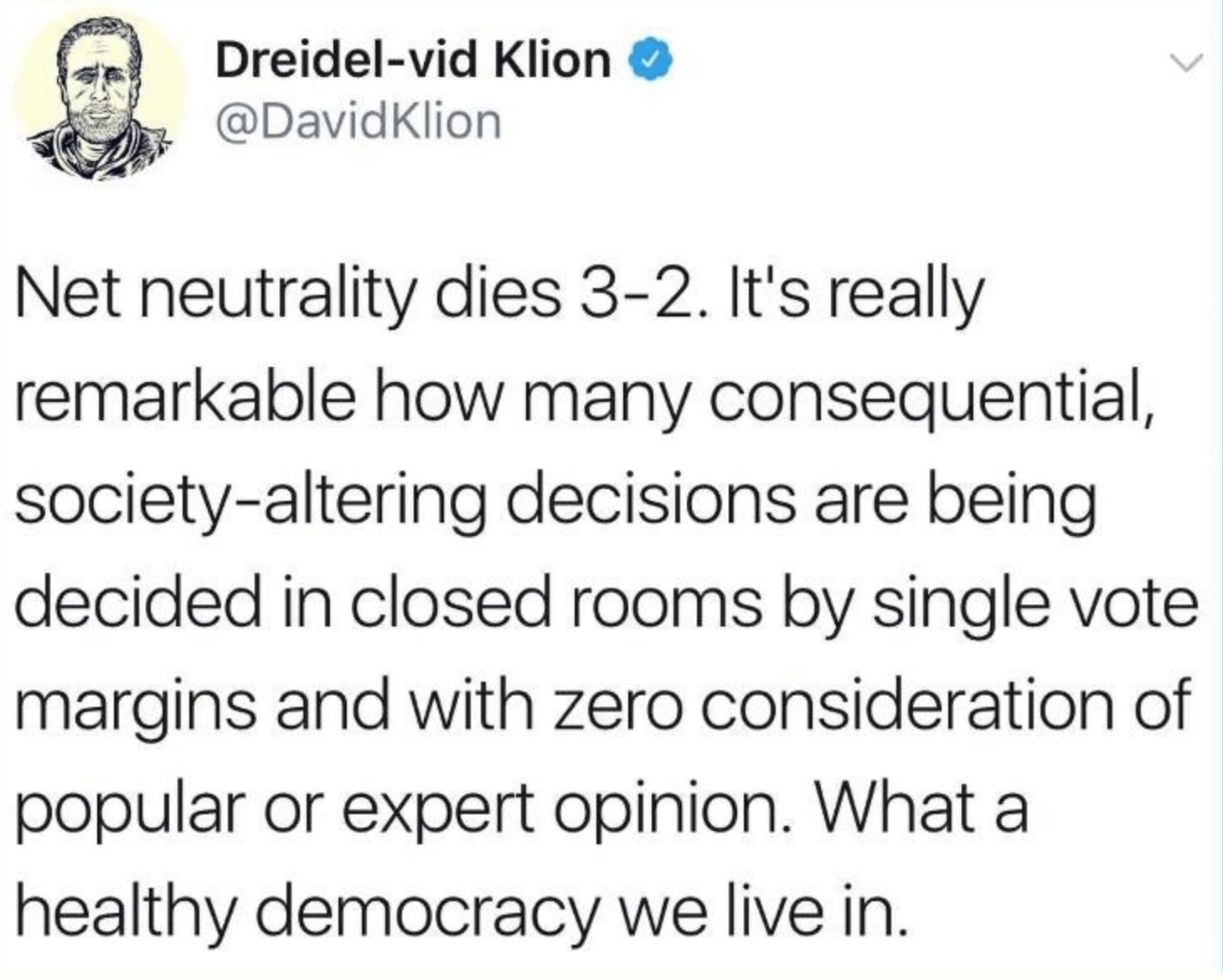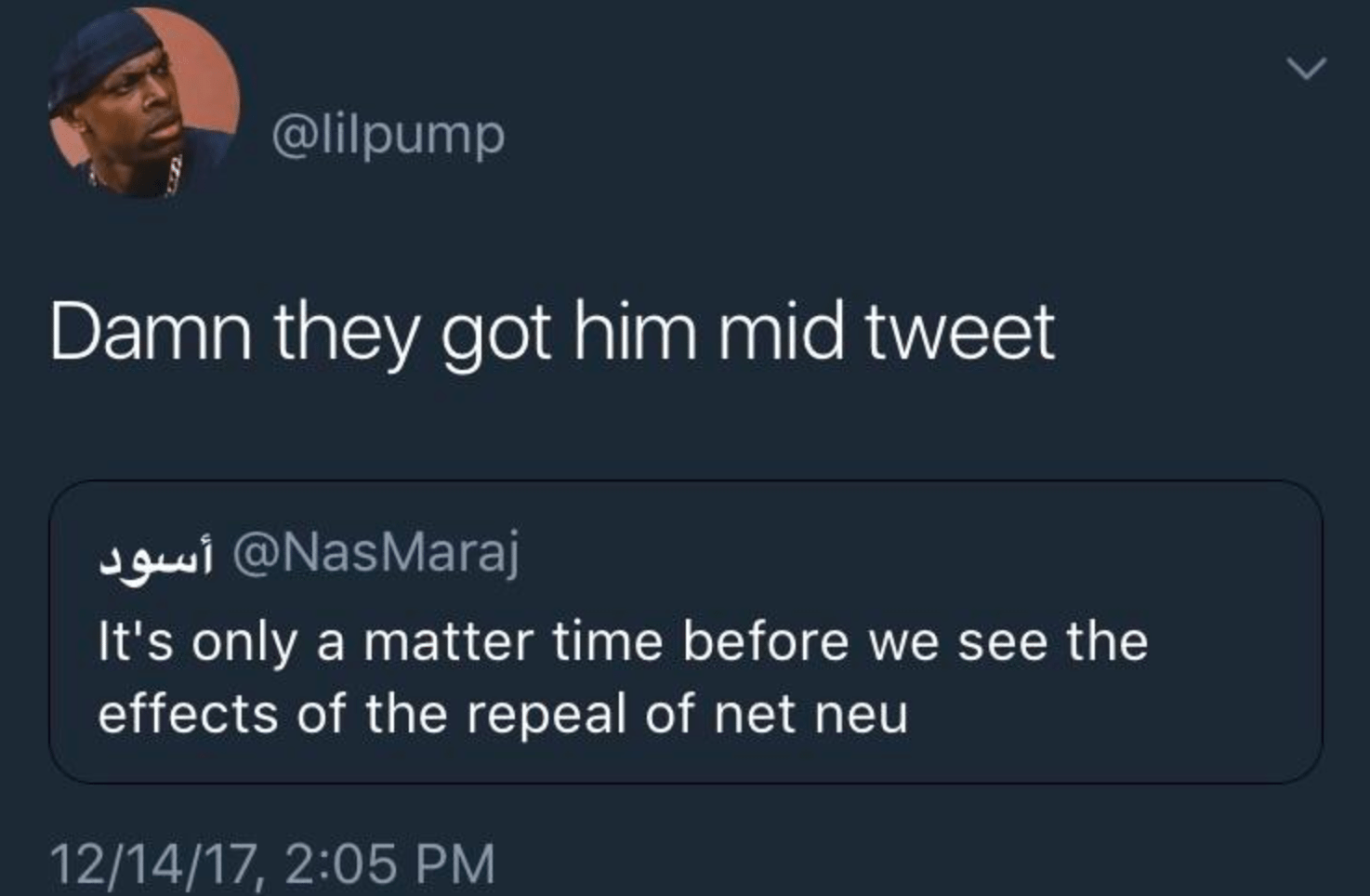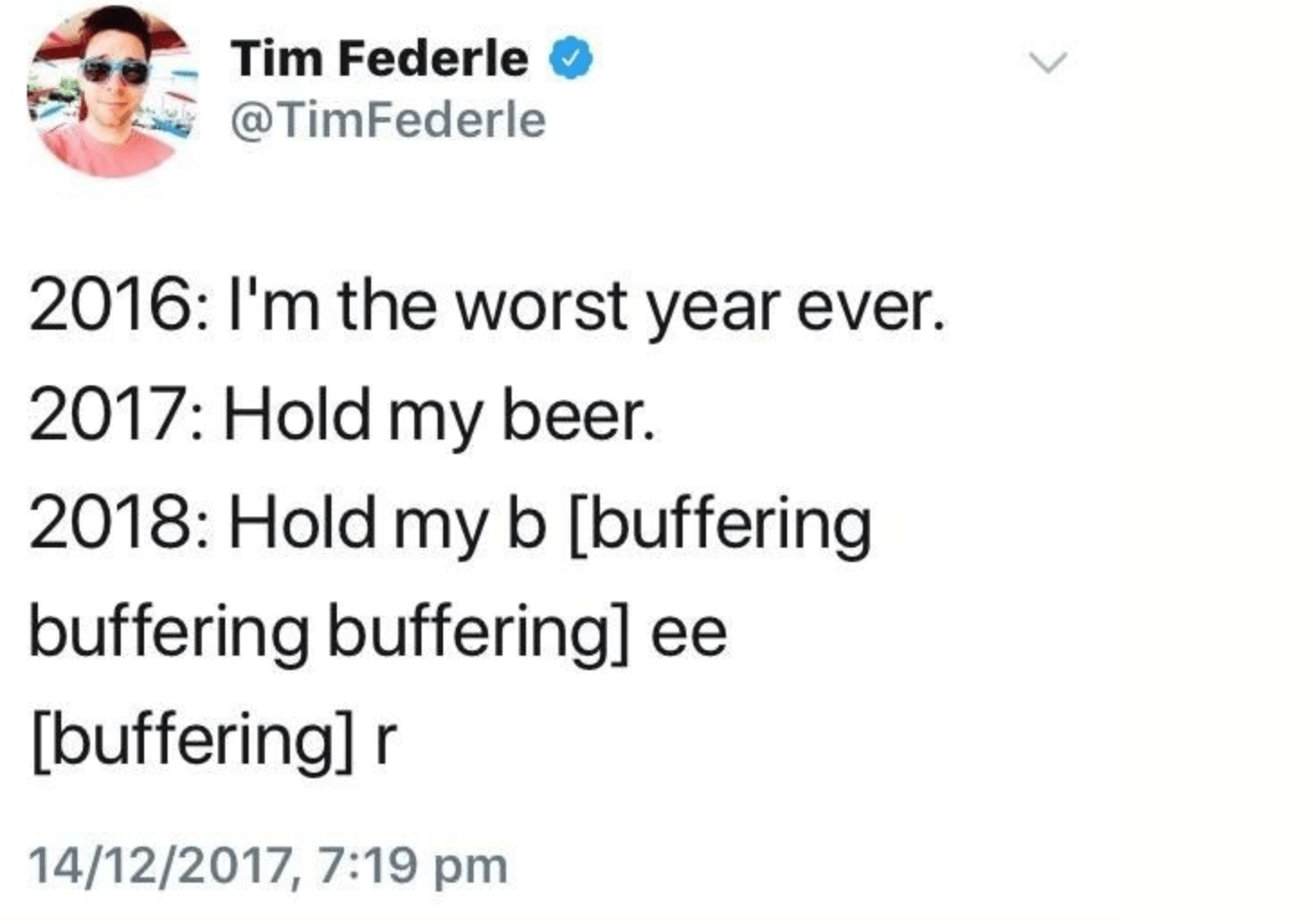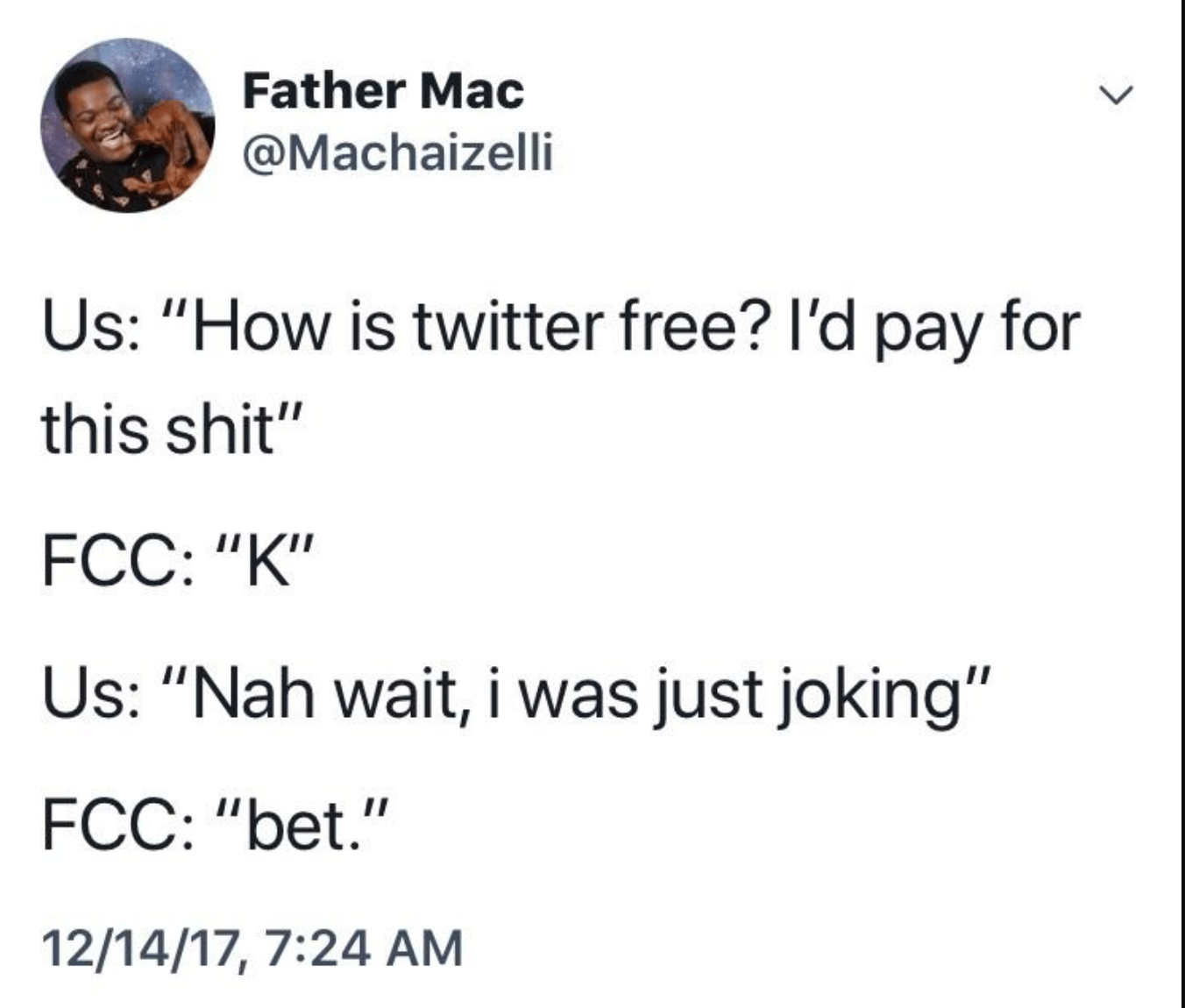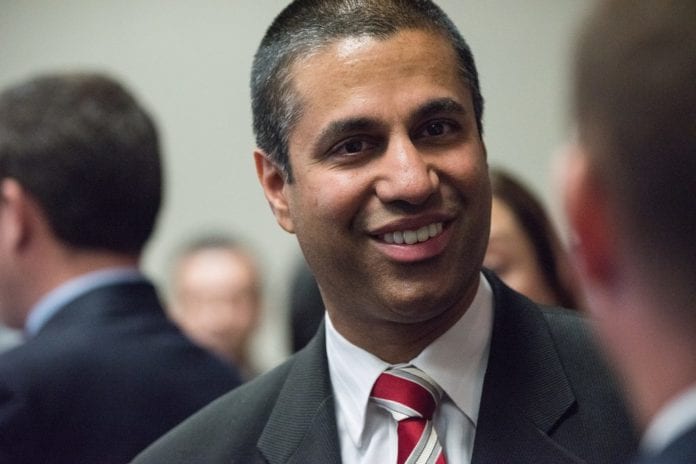A phoned-in bomb threat delayed but didn’t derail a 3-2 party-line vote of the U.S. Federal Communications Commission to undo Obama-era regulations governing net neutrality. After security officials swept the room with bomb-sniffing dogs, Republican FCC Chairman Ajit Pai, a former legal rep for Verizon, reconvened the meeting and it was over.
In the run-up to the vote, Pai attempted a stand-up routine at the annual Federal Communications Bar Association dinner–the telecom prom, if you will–that was punctuated by an eerily prescient video sketch, the contents of which leaked to the media. In the video, Verizon Senior Vice President and Deputy General Counsel of Public Policy & Government Affairs Kathy Grillo tells Pai, who is, again, a former Verizon attorney,: “As you know, the FCC is captured by industry, but we think it is not captured enough. We want to brainwash and groom a Verizon puppet to install as FCC chairman. Think ‘Manchurian Candidate.’”
“Awesome,” Pai says. “So you’ll do it?,” Grillo asks. “Absolutely,” Pai says.
Commissioner Mignon Clyburn marked her dissent with a lengthy, impassioned plea, arguing that the repeal of Title II regulations for internet service providers would render the FCC “toothless,” and calling the move the “destroying internet freedom order.”
“I am among the millions outraged,” she said. “Why are we witnessing such unprecedented groundswell of public support? Because the public can see the soon-to-be-toothless FCC is handing the keys to the internet…over to a handful of multi-billion dollar corporations. Those very same broadband internet service providers that the majority says you should trust do right for you will put shareholder profits and returns above what is best for you. The majority of americans are in favor of keeping strong net neutrality rules in place. This is the new norm at the FCC–a norm where the majority ignores the will of the people. We are standing up a mother-may-I regime where the broadband provider becomes the arbiter of acceptable online business models…When the current protections are abandoned and the rules that have been in place since 2015 have been repealed…we will be in a world where regulatory substance fades to black.”
At that point, all that will be left, she said, is the “toothy grin” of broadband providers. “What they will soon have is every incentive to do their own thing.”
Returning to his comedy roots, Pai reductively said, “Thank you Commissioner Clyburn; I’m going to mark you down as a ‘no.'”
A full broadcast of the open meeting is available here.
Commissioners Michael O’Rielly and Brendan Carr rejected as overblown the idea that a repeal of Title II protections would result in throttling internet speeds based on content, bundling content types into service packages similar to cable television, or otherwise disrupt the internet.
“This decision will not break the internet,” O’Rielly said. “Our decision is grounded in and supported by the record.
“This is a great day for consumers,” Carr said. “I’m proud to help end this two-year experiment with heavy-handed regulation and massive regulatory overreach.” Up until 2015, when the Open Internet Order was adopted, “The FCC abided by a 20-year, bipartisan consensus that the government should not control or heavily regulate internet access. The internet flourished under this framework. Every part of the internet economy benefitted. Title II did not build that. Title II did not create the open internet and Title II is not the way to maintain it. after a two-year detour, one that has seen investment decline, broadband deployments put on hold and innovative new offerings shelved, it’s great to see the FCC returning to this proven regulatory approach. Americans cherish the free and open internet. But when it comes to this proceeding, far too many are simply fanning the false flames of fear. No, the FCC is not ending the internet. The sky isn’t falling, consumers will remain protected and the internet will flourish.”
Moody’s provided a little perspective in a research note published this morning: “We believe ISPs, namely Comcast, AT&T, Verizon and Charter, will tread lightly when it comes to engaging in paid prioritization and throttling, as there could be significant negative public reaction to these acts. At least in the near term, the cost of negative publicity on their existing businesses far outweighs the benefit of additional revenue streams these companies can generate from paid prioritization agreements. We also believe there is little incentive to alter their customers’ experience, particularly in more competitive markets, and in light of our expectation for growing competition over the long term stemming from wireless 5G. The disclosure requirements, combined with FTC and DOJ authority, further limit ISPs ability to act in anticompetitive ways in regards to network management practices.”
And while the decision seems to run contrary to public opinion, at the very least, we got some great tweets out of it. Here’s a sampling:
